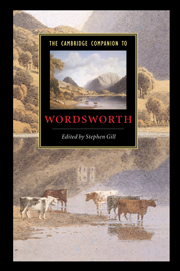Book contents
- Frontmatter
- Introduction
- 1 Wordsworth: the shape of the poetic career
- 2 Wordsworth's poetry to 1798
- 3 Poetry 1798-1807
- 4 'The noble living and the noble dead'
- 5 Wordsworth and The Recluse
- 6 Wordsworth and the meaning of taste
- 7 Wordsworth's craft
- 8 Gender and domesticity
- 9 The philosophic poet
- 10 Wordsworth and Coleridge
- 11 Wordsworth and the natural world
- 12 Politics, history, and Wordsworth's poems
- 13 Wordsworth and Romanticism
- 14 Wordsworth and America
- 15 Textual issues and a guide to further reading
- Index
- Series List
4 - 'The noble living and the noble dead'
community in The Prelude
Published online by Cambridge University Press: 28 May 2006
- Frontmatter
- Introduction
- 1 Wordsworth: the shape of the poetic career
- 2 Wordsworth's poetry to 1798
- 3 Poetry 1798-1807
- 4 'The noble living and the noble dead'
- 5 Wordsworth and The Recluse
- 6 Wordsworth and the meaning of taste
- 7 Wordsworth's craft
- 8 Gender and domesticity
- 9 The philosophic poet
- 10 Wordsworth and Coleridge
- 11 Wordsworth and the natural world
- 12 Politics, history, and Wordsworth's poems
- 13 Wordsworth and Romanticism
- 14 Wordsworth and America
- 15 Textual issues and a guide to further reading
- Index
- Series List
Summary
On his way through Westmoreland in the 1650s, the Quaker George Fox had a vision:
Here the land opened unto me, and let me see a great people in white raiment by a river side, coming to the Lord; and the place that I saw them in was about Wensleydale and Sedbergh.
Nothing so biblical appears either in Dorothy Wordsworth's Grasmere Journals (1800-3) or in her brother's poems. But the habit of mind shown in Fox's journal lived on in the conviction they shared with him, that epiphanies can take place by the roadside anywhere, and that they change a person's life. The traffic of that idea among what Wordsworth called 'the noble living and the noble dead' (1805 x 969) across two centuries of English history introduces us to the community that matters most in reading The Prelude.
For although Wordsworth’s is a secular vision, this is a deeply Protestant poem. Its roots are embedded in the dissenting tradition of confessional autobiography practised by Fox and John Wesley in their Journals, by John Bunyan in Grace Abounding, as well as by numerous authors of Methodist and Quaker conversion-narratives published throughout the eighteenth century. There are a number of important things to grasp about these narratives. First, they were written in idiomatic prose (what Wordsworth called ‘the ordinary language of men’); often read aloud to a select audience, then later dictated or transcribed; sometimes published only after the author’s death, with a view to converting others. Second, they concerned the private nature of conscience, whose accountability to God wasn’t governed by the prescripts of the Church. And third, they really did originate from the people. In mid-eighteenth-century England they gave workers and criminals, women and dissenters, the poor, the oppressed and the homeless, a medium and a voice.
- Type
- Chapter
- Information
- The Cambridge Companion to Wordsworth , pp. 55 - 69Publisher: Cambridge University PressPrint publication year: 2003



